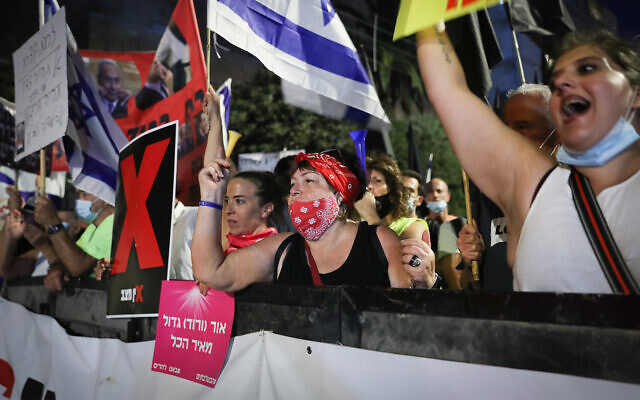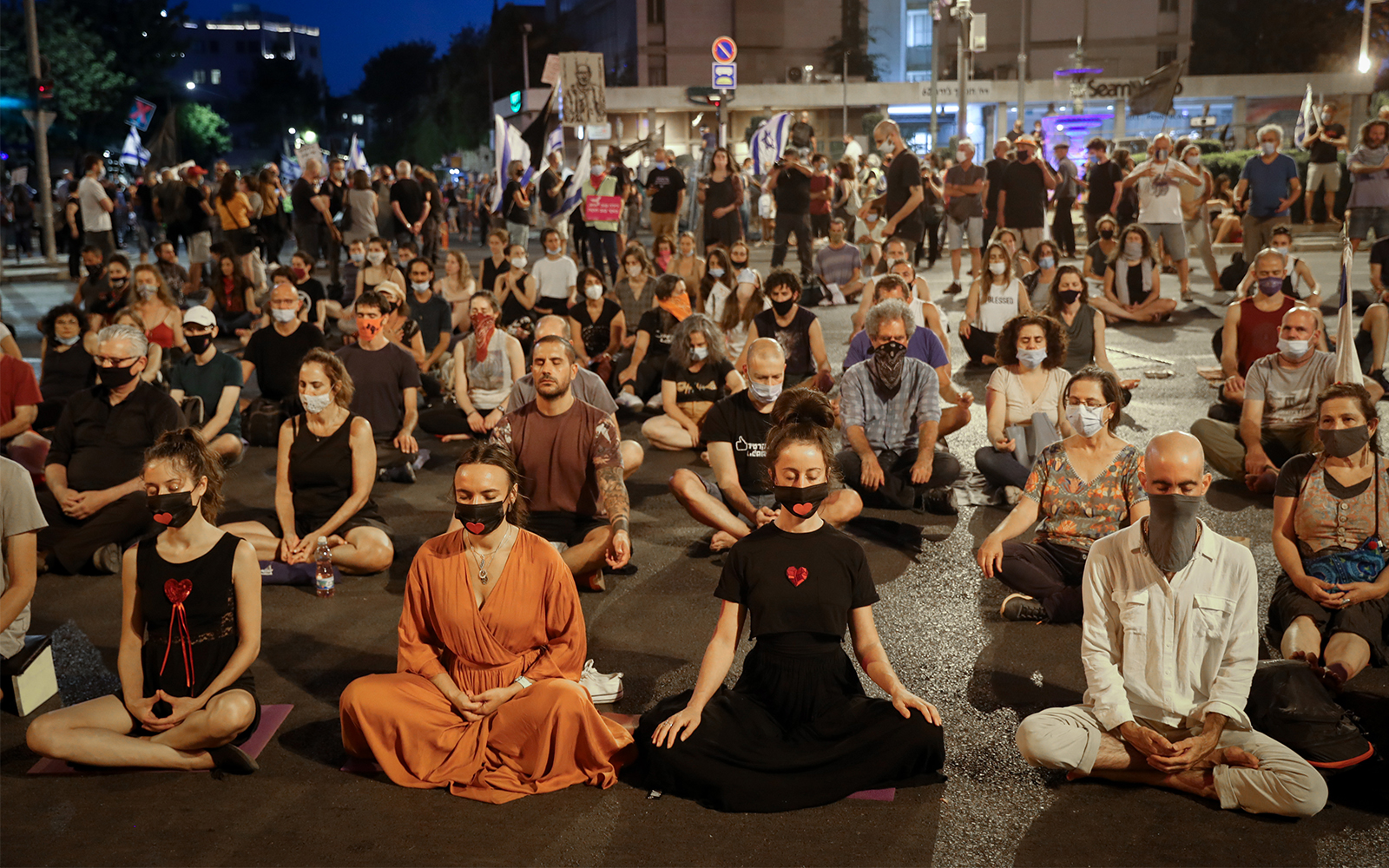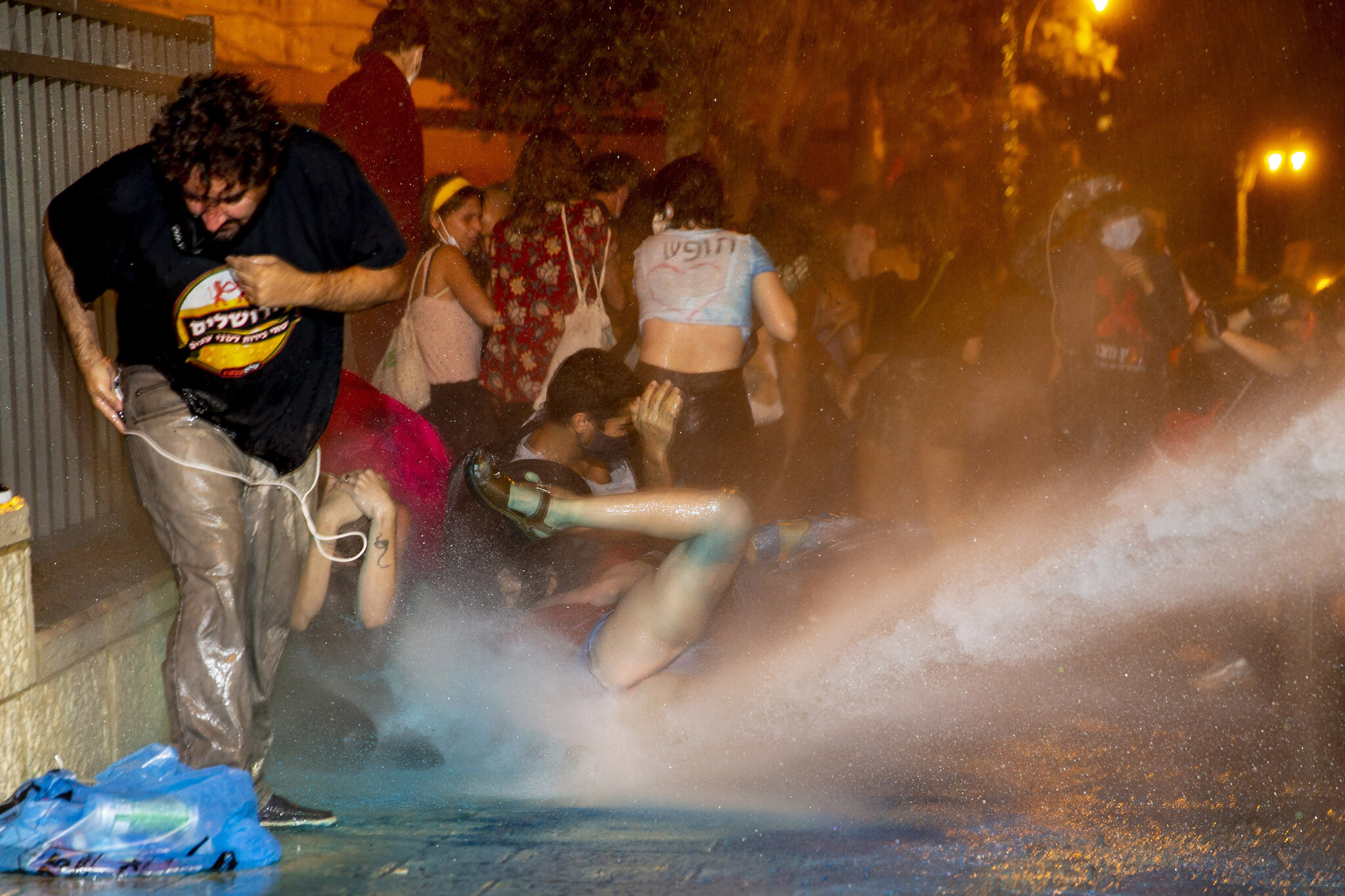Sixteen arrested, reportedly almost all from far-right group, after police deploy in force to prevent extremist Netanyahu backers from attacking anti-government demonstrators

Some 2,000 people gathered at an anti-government protest outside Prime Minister Benjamin Netanyahu’s official residence in Jerusalem on Thursday night, amid rampant fears of street violence days after far-right activists attacked anti-government demonstrators on Tel Aviv.
Protesters held signs with slogans, including, “We, the majority, are out in the street,” and “Bribery, fraud, breach of trust” — in reference to criminal charges against the premier. Unlike previous rallies, demonstrators dispersed by around midnight, without any significant clashes between demonstrators and police.
About a kilometer away, several dozen members of La Familia, a group of far-right fans of the Beitar Jerusalem soccer club, gathered at the First Station entertainment complex for their own counter-protest.
The far-right counter-protesters chanted “Death to leftists,” hurled rocks and assaulted journalists, breaking a camera. They also reportedly chased after a car that they believed carried Arab passengers.
Police said 16 people were detained for “disturbing public order, attacking demonstrators and attacking a police officer.” An official statement did not list how many of the 16 were from the far-right rally, but media reports indicated all or almost all were detained from their ranks.
שימי לב לתמונות האלה: קובי כהן, צלם חדשות 13 שהגיע לצלם את ההפגנה של לה פמיליה בירושלים הותקף, נפל על הרצפה ונחבל.
בושה! pic.twitter.com/zpM02Qeejt— almog boker (@bokeralmog) July 30, 2020
Prior to the protest police closed off a number of surrounding streets and a large number of officers were on hand, following previous scenes of violence at the protests and because of a suspected right-wing attack on anti-Netanyahu demonstrators on Tuesday night in Tel Aviv.
Israeli far-right extremists assaulted reporters, photographers, Palestinian bus driver as a thousand anti-Netanyahu protesters gather outside PM's residence https://t.co/TihGUQEmBtpic.twitter.com/8GV2rPfWzI
— avi scharf (@avischarf) July 30, 2020
Police indicated that Thursday night’s protest would not be limited in time, unlike previous protests that were dispersed using water canons and other methods after 11 p.m. or 1 a.m. Protesters were to be asked at 11 p.m. to stop making noise to avoid disturbing local residents, the report said.
The High Court of Justice rejected a petition from residents of the area who sought to have the protest officially restricted to an 11 p.m. end time.
A small protest of several dozen people held near the Tel Aviv home of Public Security Minister Amir Ohana, a Likud party ally of Netanyahu and the minister who oversees the police, ended earlier on Thursday night. Ohana was quoted last week urging police to quash the rallies.
According to multiple media reports, the police’s main concern at the Jerusalem rally was that clashes would break out between anti-Netanyahu demonstrators and members of La Familia.
Several dozen members of La Familia arrived at the First Station entertainment area near the protest Thursday evening, following a call by the group for its members to gather there.
Officers were seen trying to prevent the La Familia group from marching to the protest at the Prime Minister’s Residence.
In a post on its Facebook page on Wednesday, La Familia had called on supporters to rally at the First Station, warning that, “Haters and destroyers of Israel are continuing… to harm every Jewish concept that exists.
“Watch out, leftist rags, the rules of the game have now changed,” it warned. “We’re not prepared to remain indifferent and sit quietly.”
Protesters have claimed that the Tuesday night violence in Tel Aviv was a “planned ambush” orchestrated by a group of attackers, who left a bar, mingled among the demonstrators in the street, and launched an attack on several protesters at once. The protesters also said police were unresponsive to their pleas for help.

A court on Thursday released five suspects in the attack to house arrest.
Protesters have for weeks been holding regular rallies outside the prime minister’s residence on Balfour Street in Jerusalem, as well as in Tel Aviv and other areas, calling on the premier to resign due to his indictment on corruption charges. They have been joined in recent weeks by people protesting the government’s economic policies during the coronavirus pandemic, with crowds in the thousands and rising.
The demonstrations have increasingly set the stage for violence. Protesters have alleged violence by police on multiple occasions, as well as by right-wing counter-protesters. There have also allegedly been instances of vandalism and violence by protesters against police.

Among the measures to prevent violence on Thursday night, police had said they were planning to place more undercover officers amid the protesters, use more technology to monitor certain activists, and mobilize more officers to prevent violence against the protesters.
Acting police chief Motti Cohen said Thursday morning that security forces would allow the protests, but would counter “violence in any form, against protesters, civilians and police,” adding: “We will take determined action to the full extent of the law against those who disrupt public order.”
Many of the demonstrations, including Tuesday night’s, develop into marches. However, ahead of Thursday’s and Saturday’s protests, police were likely to ban protest marches, according to Hebrew-language media, saying that it was difficult to protect protesters when they were on the move.
Despite the focus on La Familia, Channel 12 reported that Jerusalem police were less fearful of violence by the hooligans, a group they are familiar with, than by potential attackers who are unknown to law enforcement.
A senior police official said in a closed conversation that “Israel is in a state of social chaos,” the network reported.
As reported by The Times of Israel
